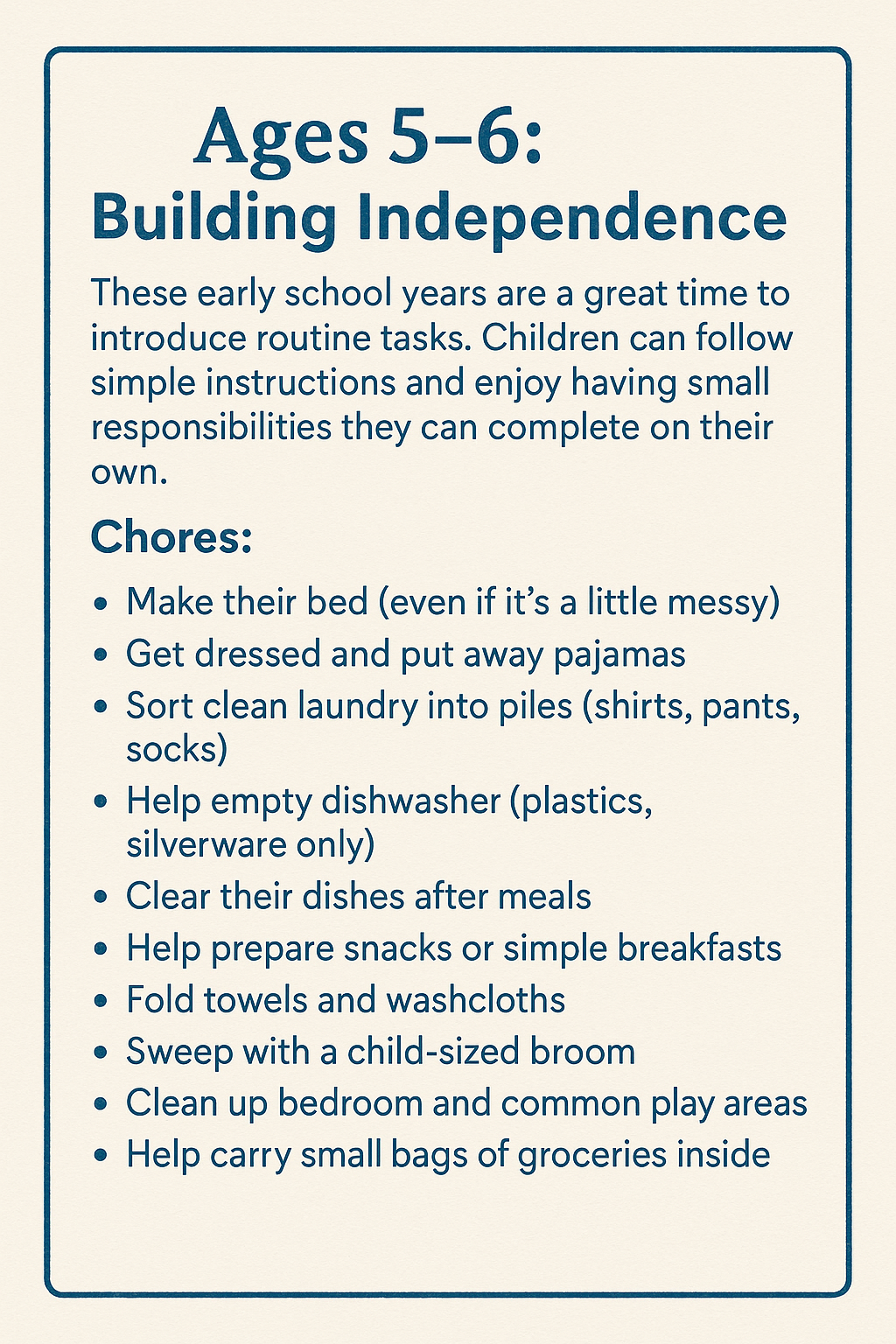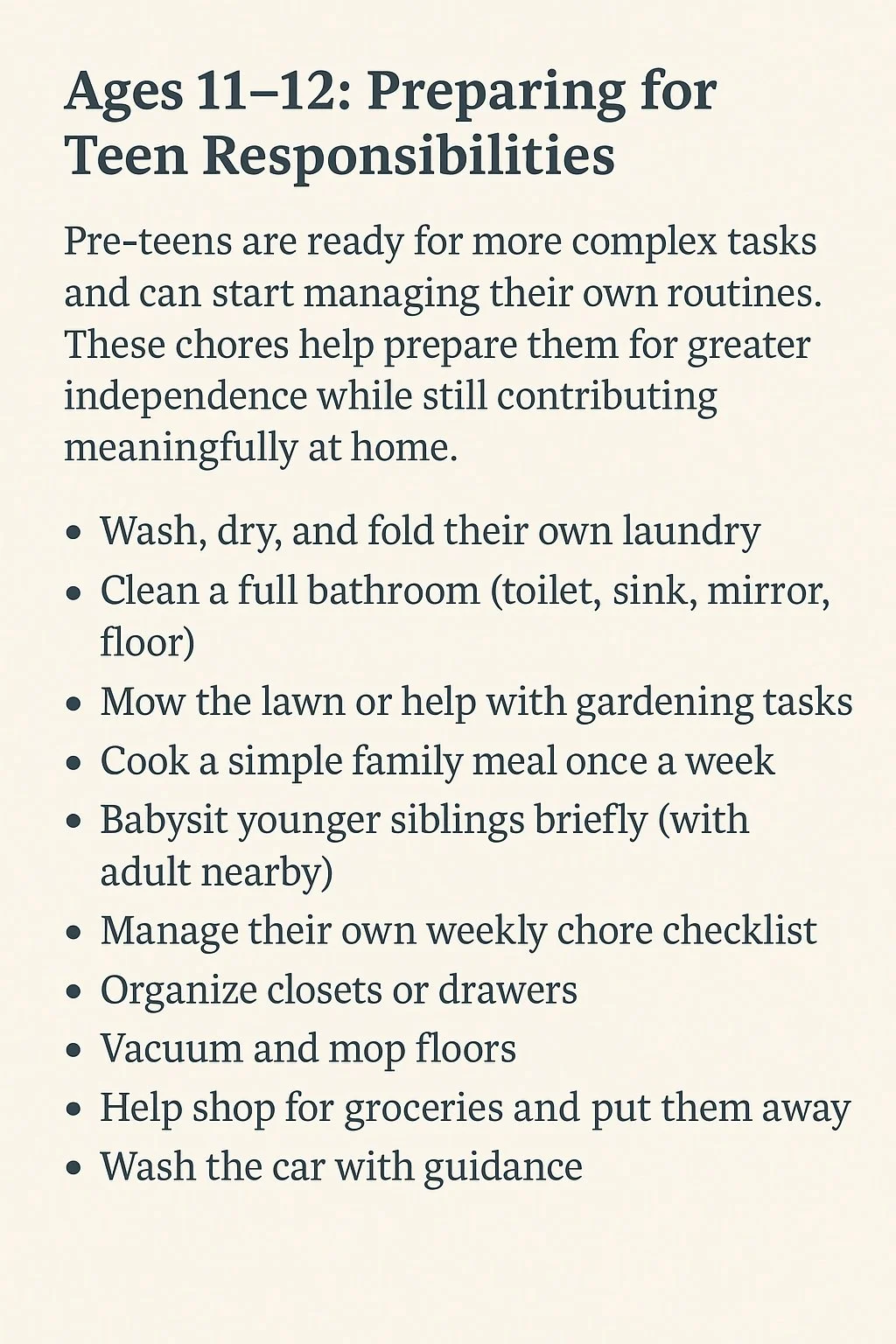Chore Charts for Kids of All Ages
Teaching kids responsibility starts with giving them age-appropriate chores that help them contribute to the household in meaningful ways. From toddlers to teens, each stage of development brings new opportunities to build confidence, independence, and valuable life skills. This chore guide breaks down helpful tasks by age group—from preschoolers just learning to clean up after themselves to teens managing laundry and meal prep. With consistency and encouragement, chores can become an empowering part of a child’s daily routine.
Chore List for Kids by Age
Ages 3–4: Learning Through Play
At this age, kids love to help and mimic what adults do. Simple, supervised tasks teach them structure and build early habits. Keep chores fun and short, and always offer praise for their efforts.
Chores:
Put toys back in bins or baskets
Place dirty clothes in the laundry hamper
Wipe up small spills with paper towels
Feed pets with assistance
Dust low shelves or baseboards with socks on their hands
Help carry light grocery items from the car
Water indoor plants with a small cup
Help match socks from a clean laundry pile
Put books back on shelves
Set napkins or non-breakable utensils on the table
Ages 5–6: Building Independence
These early school years are a great time to introduce routine tasks. Children can follow simple instructions and enjoy having small responsibilities they can complete on their own.
Chores:
Make their bed (even if it’s a little messy)
Get dressed and put away pajamas
Sort clean laundry into piles (shirts, pants, socks)
Help empty dishwasher (plastics, silverware only)
Clear their dishes after meals
Help prepare snacks or simple breakfasts
Fold towels and washcloths
Sweep with a child-sized broom
Clean up bedroom and common play areas
Help carry small bags of groceries inside
Ages 7–8: Strengthening Responsibility
Kids this age can handle more detailed chores and begin to follow multi-step directions. Providing a list or rotating weekly tasks works well to help build responsibility and follow-through.
Chores:
Fold and put away their own clothes
Make their bed daily
Pack their lunch with adult-approved items
Empty trash cans around the house
Help with cooking (measuring, stirring, light chopping)
Sweep or vacuum small rooms
Water outdoor plants or garden with supervision
Wipe down kitchen counters and tables
Clean bathroom sink and mirror with wipes
Organize a drawer or shelf in their room
Ages 9–10: Managing Chores More Independently
At this stage, children can manage consistent routines and take pride in completing tasks without constant reminders. They’re capable of helping maintain shared spaces and starting to learn life skills.
Chores:
Load and unload the dishwasher
Vacuum multiple rooms
Clean their bedroom weekly, including dusting
Take trash and recycling out to outdoor bins
Wash and dry laundry with supervision
Walk the dog (if appropriate and safe)
Make simple meals (scrambled eggs, sandwiches)
Sweep porch or entryway
Clean windows with glass cleaner and cloth
Rake leaves or help with yardwork
Ages 11–12: Preparing for Teen Responsibilities
Pre-teens are ready for more complex tasks and can start managing their own routines. These chores help prepare them for greater independence while still contributing meaningfully at home.
Chores:
Wash, dry, and fold their own laundry
Clean a full bathroom (toilet, sink, mirror, floor)
Mow the lawn or help with gardening tasks
Cook a simple family meal once a week
Babysit younger siblings briefly (with adult nearby)
Manage their own weekly chore checklist
Organize closets or drawers
Vacuum and mop floors
Help shop for groceries and put them away
Wash the car with guidance
Ages 13–14: Building Life Skills & Responsibility
Teens at this age are capable of handling more advanced chores that mirror adult responsibilities. These tasks help them build confidence, time management skills, and a greater sense of independence—skills that prepare them for high school, part-time jobs, and life beyond the home.
Chores:
Do their own laundry from start to finish (wash, dry, fold, put away)
Prepare full meals for the family (including planning and cleanup)
Deep clean shared spaces (kitchen, bathroom, living room)
Track and maintain their own calendar or chore schedule
Babysit younger siblings or neighbors (if responsible and certified)
Mow the lawn, edge the yard, and handle seasonal yardwork
Shop for groceries with a list and budget (or assist a parent)
Manage their own school supplies and organize their workspace
Take care of family pets (feeding, walking, cleaning cages or litter)
Help with basic home maintenance (change light bulbs, check smoke detectors)
Wash and vacuum the family car
Help plan family outings or dinners (research, reservations, budgeting)
Rewards by Age for Doing Chores
Ages 3–4: Encouragement & Play-Based Rewards
At this age, kids are motivated by attention, fun, and immediate gratification. Rewards should be simple, visual, and encouraging.
Sticker Chart: Let them place a sticker on a colorful chart after completing each task—it makes their progress feel exciting and visible.
Extra Storytime: Give an extra bedtime story as a reward—it’s quality time and reinforces the idea that helping earns more connection.
Choice of Activity: Let them choose what to play next (“blocks or puzzles?”)—it gives them a sense of control and ownership.
Ages 5–6: Visual Progress & Small Privileges
Kids begin to understand cause and effect. Tangible or experiential rewards help reinforce habits.
Treasure Box Pick: Offer a small toy, eraser, or trinket from a reward box at the end of the week for consistent chores.
Movie Night Pick: Let them choose the Friday night movie—it feels like a big decision and celebrates their effort.
10-Minute Bedtime Extension: A short bedtime delay on weekends feels like a major privilege at this age, especially if they’ve been working hard.
Ages 7–8: Responsibility & Earning Power
Kids love structure and earning. Introducing simple systems makes chores feel more purposeful.
Allowance or Chore Bucks: Give a small allowance or point system to “earn” fun items, teaching early money skills and effort-reward connection.
Earned Playdate: Let them schedule a playdate with a friend as a reward for consistency—it gives social motivation to keep going.
Pick a Weekend Activity: Let them choose between options like going to the park, museum, or arcade—it teaches planning and celebrates follow-through.
Ages 9–10: Independence & Goal Setting
They’re developing maturity and enjoy tracking progress toward goals and freedoms.
Bonus for Big Chores: Offer a larger reward (extra $1–2 or bonus screen time) for helping with bigger tasks—it reinforces extra effort.
Save for a Wishlist Item: Let them work toward a toy, book, or tech item they want—this builds patience and budgeting skills.
One-on-One Outing with a Parent: Time with a parent doing something fun (like getting ice cream or mini golf) becomes a cherished incentive.
Ages 11–12: Financial Literacy & Trust
Tweens are ready to manage their own rewards, especially if it mimics adult responsibility.
Weekly Allowance with Goals: Offer a consistent allowance with rules for saving and spending—it encourages financial independence.
Gift Card for a Job Well Done: A $5–10 gift card to a favorite store makes them feel grown-up and appreciated.
Earned Later Bedtime or Curfew: Grant a later weekend bedtime or curfew for sustained chore consistency—it rewards maturity with trust.
Ages 13–14: Ownership, Autonomy & Real-World Prep
Teens are motivated by freedom, social access, and trust-based rewards.
Increased Phone or Tech Time: Reward consistency with extra screen time or phone data—highly valued and easy to control.
Solo Outing or Ride to Friend’s House: Earning the freedom to go out with friends or get a ride somewhere shows you're recognizing their responsibility.
Contribution Toward Big Purchases: Match their savings or contribute toward things like a new phone, clothes, or concert tickets—it teaches smart goal setting and delayed gratification.
Related Blog posts
The Starglow Parenting Weekly
Your shortcut to purposeful parenting.
Join thousands of thoughtful parents who get our weekly roundup of tips on screen time, mindful discipline, and finding balance—delivered every Sunday morning.











